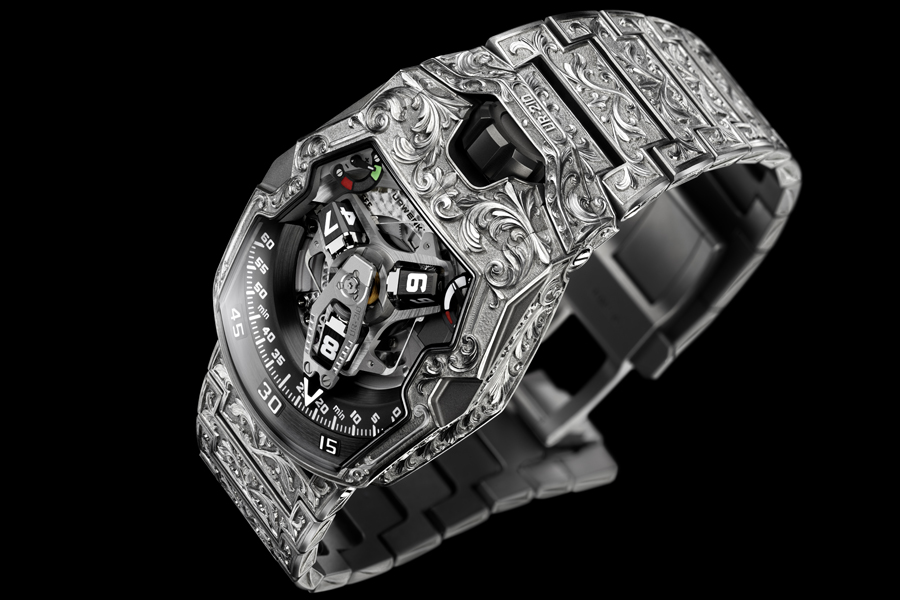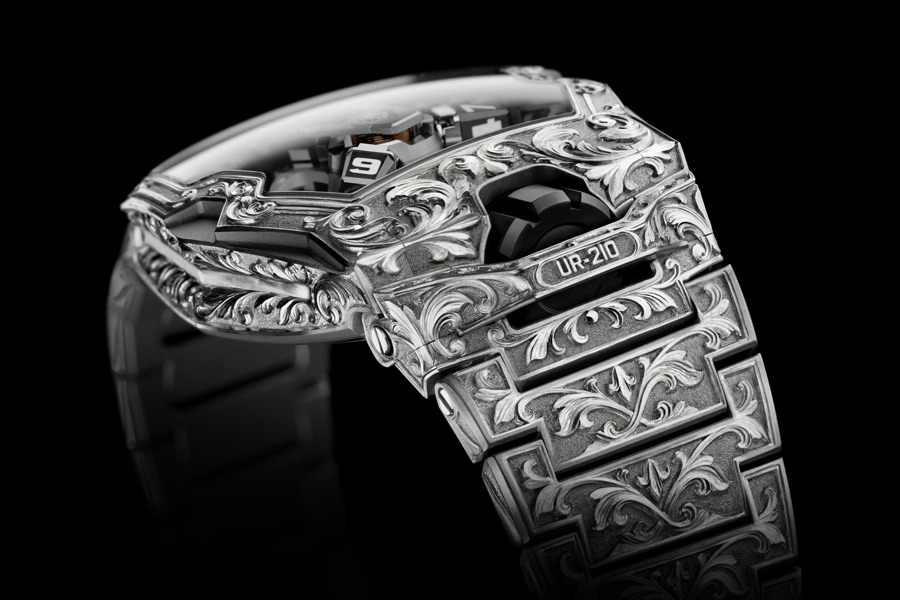Urwerk: UR-210 Amadeus
25 March 2017For its 20th anniversary, URWERK embarks on a retro-futuristic experiment. Far from being an exercise in nostalgia, the new watch makes the sort of contrary and provocative statement one has come to expect from a watchmaker that disdains the ordinary. The experiment centres on one of URWERK’s flagship models, a UR-210. Flung into a temporal particle accelerator, this futuristic watch collides with the past to emerge transfigured as a flamboyant anachronism.
“An 18th-century wall clock in the pure baroque style has pride of place in the workshops.It was one of the first collector’s pieces my father gave me — an imposing, massive work of art with elaborate gilding. For me its attraction lies in its extravagance, because extremes appeal to me,” declares watchmaker Felix Baumgartner, URWERK’s co-founder.
The memories of these first horological infatuations are certainly what inspired the new UR-210 Amadeus – Amadeus referring of course to the Great Wolfgang. “Wolfgang Amadeus Mozart was certainly a pioneer of the Punk subculture” says Felix Baumgartner. “Oneshould read his biography. He was a rebel and URWERK for sure share the spirit.”

For this retro-futuristic move, the UR-210 wastransformed by the expert hands of the talented craftsman, Florian Güllert. Baroque is an apt description of this new creation. “The decoration is very post-Renaissance 17th-century, but on a determinedly contemporary structure,” comments Florian. “The swirling pattern of acanthus leaves is most suitable for this style, contrasting with the angular look of the watch. We have merged the case, the crown protection and the bracelet into one unit to create an exceptional piece. I was given the entire watch to work on and I took it over to produce a design in steel.”
This painstaking work took more than 260 hours to complete. Ensuring the continuity of the design was the main objective and the greatest difficulty for the engraver. “It’s a work of many aspects. The themes must interconnect and complement one another without being superfluous. This is certainly one of the creations of which I am most proud,” concludes Florian.
For Martin Frei, this collision between the future and the past underlines his vision of a fluid frontier between time and space. “At URWERK, we have evolved a strikingly contemporary notion of indicating the time, yet it is based on a 17th-century concept. I see this as a continuum rather than a contradiction, in a timeless and universal dimension of ideas and thoughts. Since our beginnings, I have always questioned the idea of delineated periods of time. Where some people might see limits and rigid classifications, I see intangible bridges and links in an infinite flow.”
The UR-210’s satellite complication with retrograde minute is both highly original and totally explosive. The principal feature is a high-tech, oversized, three-dimensional retrograde minute hand. Its function is to enclose the hour satelliteand indicate the time as it transverses the 0-to-60-minute scale. This one-hour journey through time, tracing an arc of 120°, is smooth and fluid. But the true nature of the piece is revealed at the end of the 59th minute. Then a sharp distinct “click” signals the return of the minute hand to its starting point. In less than 0.1 of a second the hand flies back to dock with the next hour satellite. This high-speed retrograde system is based on three key elements:
- A central axis set in ruby bearings provides excellent stability for the satellite/retrograde complication. A cylindrical marine chronometer type spring runs vertically around the axis and generates the optimal tension required for the retrograde minutes flyback.
- A minute hand, which also forms a frame for the hour satellites, displays the time in an extraordinary way. Milled from aluminum to exacting tolerances of approximately 3 microns, the whole structure has a total weight of just 0.302g and is counter balanced by a brass weight. This three-dimensional cage offers rigidity as it transfers energy from the cylindrical flyback spring in the top center of the carrousel to the double-star gear underneath.
- A double coaxial star-shaped cam regulates the retrograde mechanism through its gearing and its rotation defines the trajectory of the minute hand. When the minute hand reaches 60, the double star trips a (one of three) hockey stick shaped spring under the mechanism, which liberates the minute to fly back to the next hour satellite at 0-minutes.

The dial of the UR-210S features a traditional power reserve indication at one o’clock. In a near mirror image at 11 o’clock we find a similar indication. No, it isn’t a duplicate fail-safe, but something much more important which deserves our full attention, because it is actually a world-first complication that indicates winding efficiency over the last two hours. Has your recent activity been enough to replenish your UR-210’s energy levels? If yes, the winding efficiency indicator will point emphatically to the green zone. If not, you have been using more energy than you are generating, and the winding efficiency indicator will point to the red zone.
Armed with knowledge of both winding efficiency and available power reserve, you are then able to intervene. If your UR-210 indicates an insufficient supply of energy, you can position the winding efficiency selector at the back of the watch to “FULL”. The rotor will then convert the slightest movement into stored energy. In this configuration, a turbine connected to the rotor provides smooth, unimpeded power. But if you are more active, then that may provide more power than required and unnecessarily wear the mechanism. In that case, you would position the winding efficiency selector to “REDUCED” to engage the rotor damping system. An air turbine compressor mounted on ruby bearings spins and creates internal resistance – enough friction to slow down or dampen the automatic winding rotor. In “STOP” mode, the automatic winding system is disabled completely and the UR-210 runs off reserve power and may require manual winding.
By Jacopo Corvo
